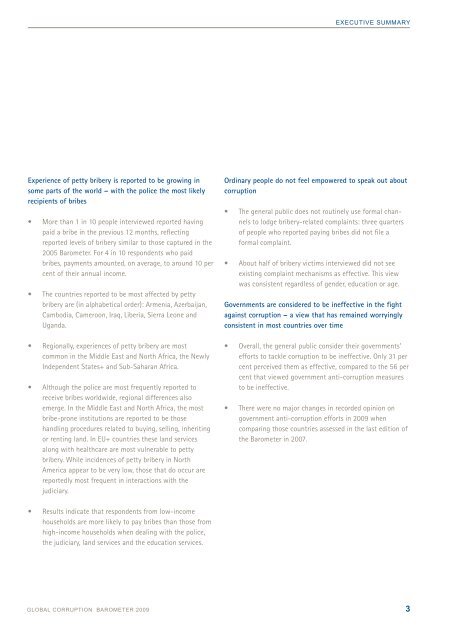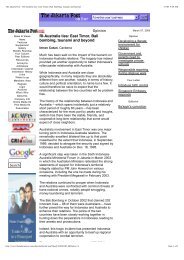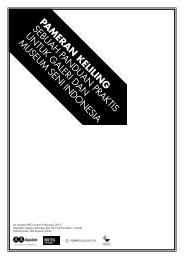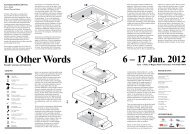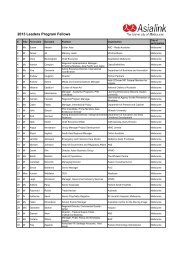GLOBAL CORRUPTION BAROMETER - Asialink
GLOBAL CORRUPTION BAROMETER - Asialink
GLOBAL CORRUPTION BAROMETER - Asialink
Create successful ePaper yourself
Turn your PDF publications into a flip-book with our unique Google optimized e-Paper software.
EXECUTIVE SUMMARY<br />
Experience of petty bribery is reported to be growing in<br />
some parts of the world – with the police the most likely<br />
recipients of bribes<br />
<br />
<br />
<br />
paid a bribe in the previous 12 months, reflecting<br />
reported levels of bribery similar to those captured in the<br />
2005 Barometer. For 4 in 10 respondents who paid<br />
bribes, payments amounted, on average, to around 10 per<br />
cent of their annual income.<br />
<br />
bribery are (in alphabetical order): Armenia, Azerbaijan,<br />
Cambodia, Cameroon, Iraq, Liberia, Sierra Leone and<br />
Uganda.<br />
Ordinary people do not feel empowered to speak out about<br />
corruption<br />
<br />
<br />
nels<br />
to lodge bribery-related complaints: three quarters<br />
of people who reported paying bribes did not file a<br />
formal complaint.<br />
<br />
existing complaint mechanisms as effective. This view<br />
was consistent regardless of gender, education or age.<br />
Governments are considered to be ineffective in the fight<br />
against corruption – a view that has remained worryingly<br />
consistent in most countries over time<br />
<br />
<br />
<br />
common in the Middle East and North Africa, the Newly<br />
Independent States+ and Sub-Saharan Africa.<br />
<br />
receive bribes worldwide, regional differences also<br />
emerge. In the Middle East and North Africa, the most<br />
bribe-prone institutions are reported to be those<br />
handling procedures related to buying, selling, inheriting<br />
or renting land. In EU+ countries these land services<br />
along with healthcare are most vulnerable to petty<br />
bribery. While incidences of petty bribery in North<br />
America appear to be very low, those that do occur are<br />
reportedly most frequent in interactions with the<br />
judiciary.<br />
<br />
<br />
<br />
efforts to tackle corruption to be ineffective. Only 31 per<br />
cent perceived them as effective, compared to the 56 per<br />
cent that viewed government anti-corruption measures<br />
to be ineffective.<br />
<br />
government anti-corruption efforts in 2009 when<br />
comparing those countries assessed in the last edition of<br />
the Barometer in 2007.<br />
<br />
<br />
households are more likely to pay bribes than those from<br />
high-income households when dealing with the police,<br />
the judiciary, land services and the education services.<br />
<strong>GLOBAL</strong> <strong>CORRUPTION</strong> <strong>BAROMETER</strong> 2009 3


